Bourke Ulick J. Aryan Origin of the Gaelic Race and Language
Подождите немного. Документ загружается.

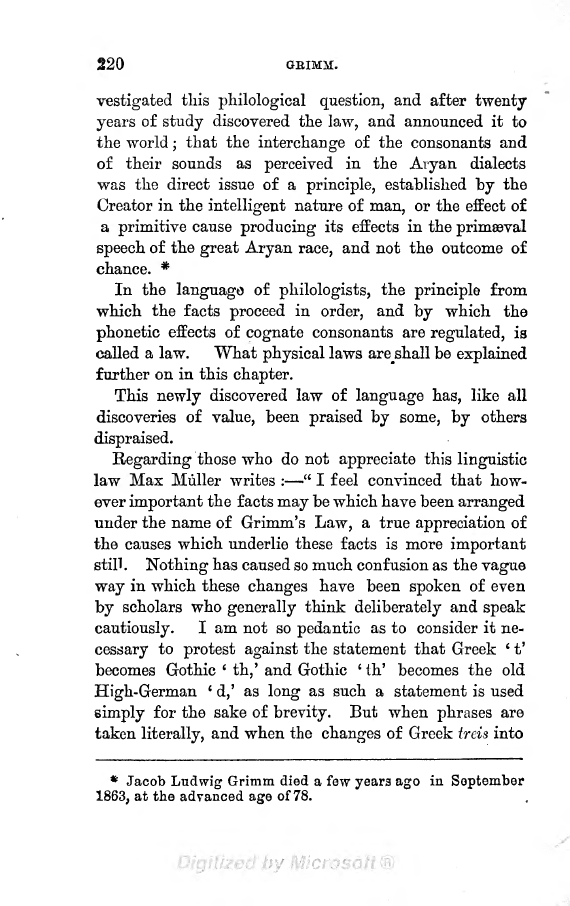
220
GBIMM.
vestigated
this
philological
question,
and
after
twenty
years
of
study
discovered the
law,
and
announced
it
to
the world
;
that the
interchange
of
the
consonants
and
of
their
sounds
as
perceived
in the
Aryan
dialects
was
the
direct issue of a
principle,
established
by
the
Creator
in the
intelligent
nature of
man,
or
the effect
of
a
primitive
cause
producing
its effects
in
the
primaeval
speech
of the
great
Aryan
race,
and not
the outcome
of
chance.
*
In the
language
of
philologists,
the
principle
from
which
the
facts
proceed
in
order,
and
by
which the
phonetic
effects of
cognate
consonants
are
regulated,
is
called
a law.
What
physical
laws
are
shall be
explained
further
on
in
this
chapter.
This
newly
discovered
law
of
language
has,
like
all
discoveries
of
value,
been
praised by
some,
by
others
dispraised.
Regarding
those who
do not
appreciate
this
linguistic
law
Max
Miiller writes :
"
I
feel
convinced
that
how-
ever
important
the facts
may
be
which
have been
arranged
under
the
name of Grimm's
Law,
a true
appreciation
of
the
causes
which underlie these
facts
is more
important
still.
Nothing
has
caused so much confusion as
the
vague
way
in
which
these
changes
have
been
spoken
of
even
by
scholars who
generally
think
deliberately
and
speak
cautiously.
I am
not so
pedantic
as to consider
it
ne-
cessary
to
protest
against
the statement that Greek
'
t'
becomes Gothic
'
th,'
and Gothic
'
ih'
becomes
the old
High-German
'
d,'
as
long
as such a
statement
is
used
simply
for
the
sake
of
brevity.
But when
phrases
are
taken
literally,
and when
the
changes
of
Greek
irds into
*
Jacob
Lndwig
Grimm
died
a
few
years
ago
in
September
1863,
at the
advanced
age
of
78.
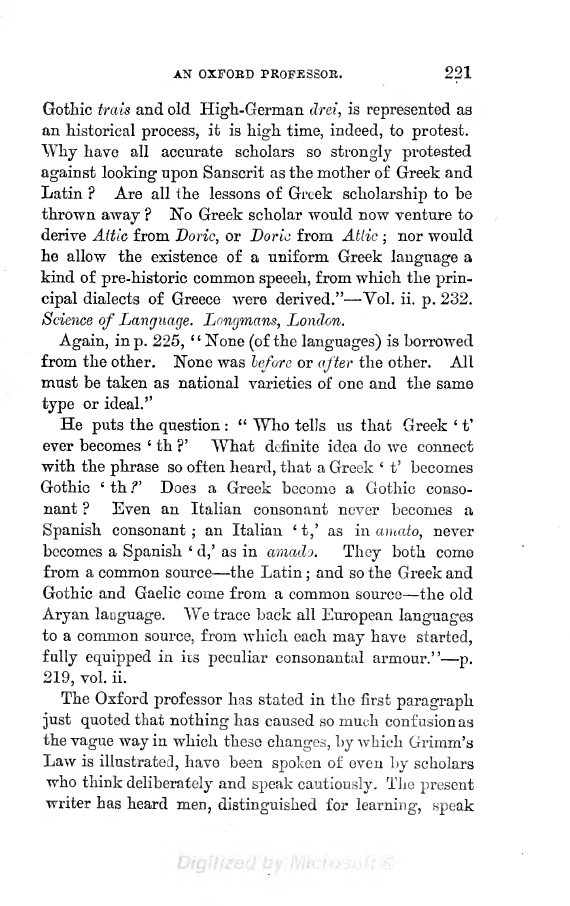
AN
OXFOBD
PROFESSOR.
221
Gothic
trais
and old
High-German
drei,
is
represented
as
an
historical
process,
it
is
high
time,
indeed,
to
protest.
Why
have
all accurate scholars
so
strongly
protested
against
looking upon
Sanscrit as the mother of Greek and
Latin
?
Are
all the lessons
of
Greek
scholarship
to
be
thrown
away
?
No Greek scholar
would
now
venture
to
derive Attic from
Doric,
or Doric from Attic
;
nor
would
he
allow the
existence of a
uniform
Greek
language
a
kind
of
pre-historic
common
speeeh,
from
which the
prin-
cipal
dialects
of
Greece
were
derived."
Vol. ii.
p.
232.
Science
of Language.
Longmans,
London.
Again,
in
p.
225,
' '
None
(of
the
languages)
is borrowed
from
the
other.
None was
lefore
or
after
the other. All
must
be taken
as national
varieties of one and
the
same
type
or
ideal."
He
puts
the
question
:
"
Who
tells us
that
Greek
'
t'
ever becomes
'
th
?' What
definite idea do we connect
with the
phrase
so often
heard,
that
a
Greek
'
t'
becomes
Gothic
*
th
?'
Does
a
Greek
become
a
Gothic
conso-
nant
?
Even an Italian
consonant
never
becomes
a
Spanish
consonant
;
an Italian
'
t,'
as
in
amato,
never
becomes
a
Spanish
'
d,'
as
in
amado.
They
both
come
from
a
common
source the Latin
;
and so the
Greek
and
Gothic
and
Gaelic come from a
common
source
the old
Aryan language.
We
trace back all
European
languages
to a common
source,
from
which each
may
have
started,
fully equipped
in
its
peculiar
consonantal
armour."
p.
219,
vol. ii.
The
Oxford
professor
has
stated in the
first
paragraph
just
quoted
that
nothing
has
caused
so
much
confusion
as
the
vague
way
in
which these
changes,
by
which
Grimm's
Law is
illustrated,
have
been
spoken
of even
by
scholars
who
think
deliberately
and
speak
cautiously.
The
present
writer
has
heard
men,
distinguished
for
learning,
speak
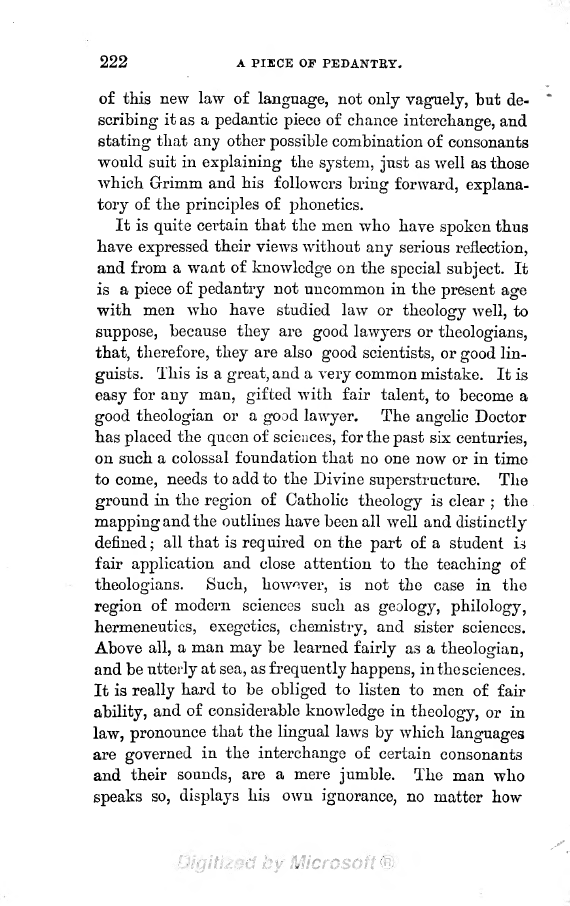
222
A
PIECE OF
PEDANTRY.
of
this
new law of
language,
not
only
vaguely,
but
de-
scribing
it
as
a
pedantic piece
of
chance
interchange,
and
stating
that
any
other
possible
combination of
consonants
would suit
in
explaining
the
system,
just
as well
as those
which Grimm and his
followers
bring
forward,
explana-
tory
of the
principles
of
phonetics.
It is
quite
certain
that
the
men
who
have
spoken
thus
have
expressed
their
views without
any
serious
reflection,
and from
a want
of
knowledge
on the
special
subject.
It
is
a
piece
of
pedantry
not
uncommon in
the
present
age
with
men
who
have studied
law or
theology
well,
to
suppose,
because
they
are
good
lawyers
or
theologians,
that,
therefore,
they
are
also
good
scientists,
or
good
lin-
guists.
This
is a
great,
and a
very
common
mistake. It
is
easy
for
any
man,
gifted
with fair
talent,
to
become
a
good
theologian
or
a
good
lawyer.
The
angelic
Doctor
has
placed
the
queen
of
sciences,
for
the
past
six
centuries,
on such
a colossal
foundation
that
no one
now or in
time
to
come,
needs
to
add
to
the
Divine
superstructure.
The
ground
in
the
region
of
Catholic
theology
is clear
;
the
mapping
and the outlines
have
been all
well and
distinctly
defined
;
all that
is
req
uired
on
the
part
of
a
student is
fair
application
and
close attention
to the
teaching
of
theologians.
Such,
howover,
is not
the case in the
region
of
modern
sciences such
as
geology, philology,
hermeneutics,
exegetics,
chemistry,
and
sister
sciences.
Above
all,
a man
may
be
learned
fairly
as a
theologian,
and
be
utterly
at
sea,
as
frequently happens,
in
the
sciences.
It
is
really
hard to be
obliged
to
listen to
men
of
fair
ability,
and
of
considerable
knowledge
in
theology,
or in
law,
pronounce
that
the
lingual
laws
by
which
languages
are
governed
in the
interchange
of
certain
consonants
and
their
sounds,
are
a mere
jumble.
The
man
who
speaks
so,
displays
his
own
ignorance,
no
matter ho\v

THREE POINTS.
223
much
the few
friends
around
him
may
appear
to
sustain
the
sense,
or
sapiency
of
such
oracular utterances.
But
to
return What
is this law
discovered
by
Grimm
?
It
may
be
stated
fully
in this wise :
"
There
are
in
the
Aryan language
three
principal
points
of consonantal
contact,
the
guttural,
the
dental,
and the labial
<k,'
t,"p.'"
The consonant
"
k"
represent
the
guttural,
or throat-
letter;
"t,"
the
dental,
or
tooth-letter,
and
"p,"
the
labial,
or
lip-letter.
The consonant
"
k" is
articulated
chiefly by
the action
of the
throat,
opening
the
mouth
and
uttering
a
volume
of voice
from
the
chest
;
"
t,"
by
the
action
of the
tongue
pressed against
the
front
teeth,
raised
slightly,
and
"
p" by
pressing
the
lips
hard,
and
then
emitting
the
breath
quickly
through
the
partially
re-opened
mouth.
These are the three
points
at which
articulate
sounds are
produced
the
throat,
the
teeth,
the
lips.
Now,
"at
each of
these
three
points
there
are two
modes
of
utterance,
the
hard and
the
soft
;
each in
turn
is
liable to
aspiration,
though
only
in
certain
languages."
Hence we have
the hard checks at the
three
points,
"
k" or"
c,"
"
t,"
"p
;"
and the
soft
checks,
"g,"
"d,"
"b."
The
guttural
"
k,"
(hard)
if uttered
with a
soft
check,
is
"
g,"
like
"
g"
in
"gum;"
the dental
"t,"
if
uttered
with
a
soft
check,
become
"
d,"
and
the hard
labial
"p"
becomes
"
b,"
when
uttered
quietly
and
softly,
as
"
pen,"
"
ben,"
"
pin,"
"
bin."
"
We
know,"
says
the
Professor
of
philology
at
Oxford,
"
from
the
physiological
analysis
of the
alphabet,
that
three or
sometimes
four varieties
exist
for
each of
the
three
consonantal
contacts.
We
may,
for
example, pro-
nounce
'
p'
as
a
hard letter
by
cutting
the
breath
sharply
with
our
lips
;
we
may pronounce
it
as
a
soft
letter,
by
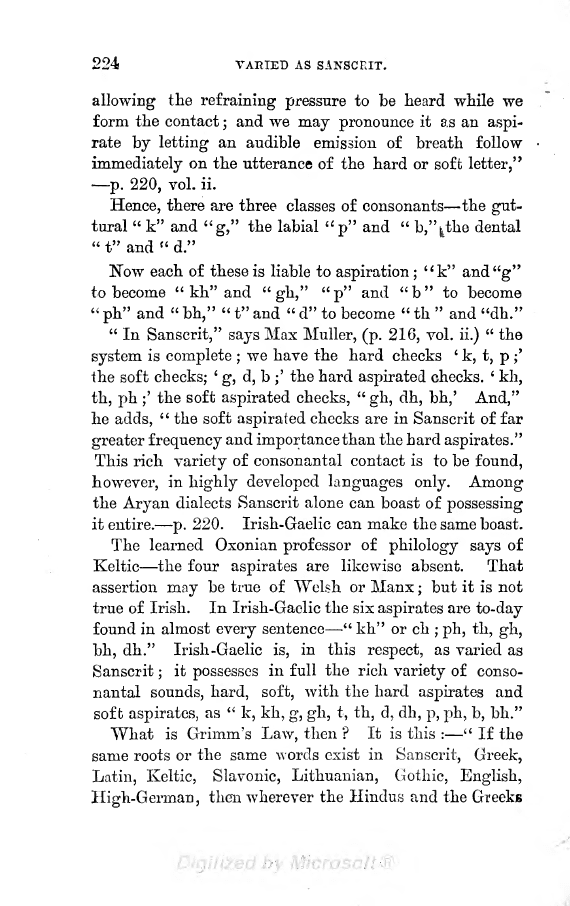
224
VARIED AS
SANSCRIT.
allowing
the
refraining pressure
to
be
heard while
we
form
the contact
;
and we
may pronounce
it
as an
aspi-
rate
by letting
an
audible
emission
of
breath
follow
immediately
on
the utterance
of the hard or
soft
letter,"
p.
220,
vol.
ii.
Hence,
there are
three
classes
of consonants
the
gut-
tural
"
k" and
"g,"
the
labial
"p"
and
"
b/'^the
dental
"
t"
and
d."
Now each
of
these is
liable
to
aspiration
;
"k" and
u
g"
to become
"
kh" and
"
gh,"
"
p"
and
"
b
"
to
become
"
ph"
and
"
bh,"
"
t"
and
"
d" to
become
"
th
"
and
"dh."
"
In
Sanscrit,"
says
Max
Muller,
(p.
216,
vol.
ii.)
"
the
system
is
complete
;
we have
the hard
checks
'
k,
t,
p
;'
the
soft
checks;
'
g,
d,
b
;'
the hard
aspirated
checks.
'
kh,
th,
ph
;'
the
soft
aspirated
checks,
"
gh,
dh,
bh/
And,"
he
adds,
"
the
soft
aspirated
checks
are in
Sanscrit of
far
greater frequency
and
importance
than
the hard
aspirates."
This rich
variety
of consonantal
contact
is
to be
found,
however,
in
highly
developed languages
only.
Among
the
Aryan
dialects
Sanscrit
alone
can
boast of
possessing
it
entire.
p.
220.
Irish-Gaelic can make the
same boast.
The
learned Oxonian
professor
of
philology
says
of
Keltic
the four
aspirates
are likewise
absent.
That
assertion
may
be
true of
Welsh
or Manx
;
but
it
is
not
true of Irish.
In Irish-Gaelic
the
six
aspirates
are
to-day
found
in almost
every
sentence
"
kh" or
ch
;
ph,
th,
gh,
bh,
dh." Irish
-Gaelic
is,
in this
respect,
as varied
as
Sanscrit
;
it
possesses
in full the rich
variety
of
conso-
nantal
sounds,
hard,
soft,
with the hard
aspirates
and
soft
aspirates,
as
"
k,
kh,
g,
gh,
t,
th, d, dh,
p, ph,
b,
bh."
What
is Grimm's
Law,
then
?
It is this :
"
If
the
same
roots
or
the
same
words
exist
in
Sanscrit,
Greek,
Latin,
Keltic, Slavonic,
Lithuanian,
Gothic,
English,
High-German,
then wherever
the
Hindus
and the
Greeks

A SCHEMA.
225
pronounce
an
aspirate,
the
Goths,
Low-German,
English,
Irish,
pronounce
the
corresponding
soft
check,
and
the
old
High-German
the
corresponding
hard
check.
In this
change
the
Keltic,
Gothic, Slavonic,
and
Lithuanian
are
in
accord.
Hence
the
following
formula
:
I.
Greek
and
Sanscrit,
kh, tli,
pli,
hard
asp.
II.
Irish-Gaelic
and
Gothic,
g,
d,
b,
soft
checks.
III.
Old
High-German,
k, t,
p,
hard
checks.
The
letters
used
here are
symbols
of the
sounds,
viewed
philosophically,
and not as
the
letters
which
occur
in
the
respective
languages.
Thus,
"
kh"
represents
the
"
gh"
of
Sanscrit
;
the
"
ch
or chi"
of Greek
;
the
"
h,
or
gn,
or
m'' of Latin
:
"
th,"
also
is the
symbol
of the
Sanscrit
"
dli
;'
the
Gfreek
theta,
"
th,"
and
the Latin
"
d"
or
"d
;"
"
ph"
stands
for
"
bh,"
Sanscrit';
"
ph,"
Greek
;" f,"
Latin.
IV.
Again,
if Greek
have
g,
d.
b,
soft
checks
V.
Irish-Gaelic
and
Gothic
have
k, t,
p,
hard
checks
VI.
And old
High-German,
ch,
th,
or
z,
ph,
or
f,
hard
aspirates.
Lastly
VII.
If Greek
have
k,
t,
p,
hard,
VII.
Then
Irish-Gaelic
and
Gothic
have
kh,
or
ch,
h,
alone or
g,
th, kh,
f
,
bh.
IX.
Old
High-German,
g,
d,
b.
Thus in one
schema.
Gutturals.
dentals.
Labials.
'
k
kh r
ch
>
*'
S
h *
th d
'
dh
P> P
h
>
b
>
m
.
GermSn
}
g,
&
k,
o, kh,
oh
d,
t,
th,
th
b,
p,
ph, i;
The
word
which
commences
with
"p"
in
the
original
is
found
in
another
language
t.> have
"
ph"
or
<c
f"
as
its
initial;
and in
a
third,
"
b" or
{{
bh."
If a term
have
"
c"
in
one
lan-
guage,
its
equivalent
in
another
has
"
ch"
or
"
kh,"
and
iu
a
N
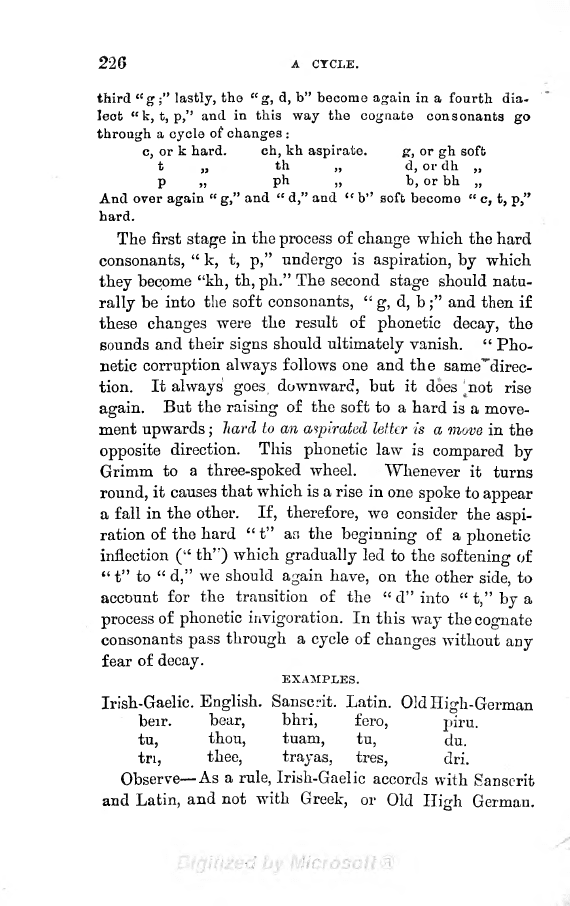
226
A
CYCLE.
third
"
g
;"
lastly,
the
"g,
d,
b"
become
again
in
a
fourth
dia-
lect
"k, t,
p,"
and
in
this
way
the
cognate
consonants
go
through
a
cycle
of
changes
:
c,
or
k
hard.
ch,
kh
aspirate.
g,
or
gh
soft
t
th
d,
or dh
p
ph b,
or
bh
And
over
again
"
g,"
and
"
d,"
and
lt
b" soft
become
"
c,
t, p,"
hard.
The first
stage
in the
process
of
change
which the
hard
consonants,
"
k,
t,
p,"
undergo
is
aspiration,
by
which
they
become
"kh,
th,
ph."
The
second
stage
should natu-
rally
be
into
the
soft
consonants,
"
g,
d,
b
;"
and
then
i
these
changes
were
the result of
phonetic
decay,
the
Bounds
and
their
signs
should
ultimately
vanish.
"
Pho-
netic
corruption
always
follows
one
and
the
same~direc-
tion.
It
always goes
downward,
but it
does
;not
rise
again.
But
the
raising
of the
soft to a
hard
is
a
move-
ment
upwards
;
hard to an
aspirated
letter is
a
move in
the
opposite
direction.
This
phonetic
law
is
compared
by
Grimm
to
a
three-spoked
wheel.
Whenever
it
turns
round,
it causes
that which is
a
rise in
one
spoke
to
appear
a
fall
in the
other.
If,
therefore,
we
consider
the
aspi-
ration
of
the
hard
"
t" an the
beginning
of a
phonetic
inflection
("
th")
which
gradually
led
to the
softening
of
"
t"
to
"
d,"
we
should
again
have,
on
the
other
side,
to
account
for
the transition of
the
"
d"
into
"
t,"
by
a
process
of
phonetic
irivigoration.
In
this
way
the
cognate
consonants
pass
through
a
cycle
of
changes
without
any
fear
of
decay.
EXAMPLES.
Irish-Gaelic.
English.
Sanscrit.
Latin.
0]d
High-German
beir.
bear, bhri,
fero,
piru.
tu,
thou, tuam,
tu,
du.
tri,
thee,
tray
as,
tres,
dri.
Observe
As
a
rule,
Irish-Gaelic
accords
with
Sanscrit
and
Latin,
and
not with
Greek,
or
Old
High
German.
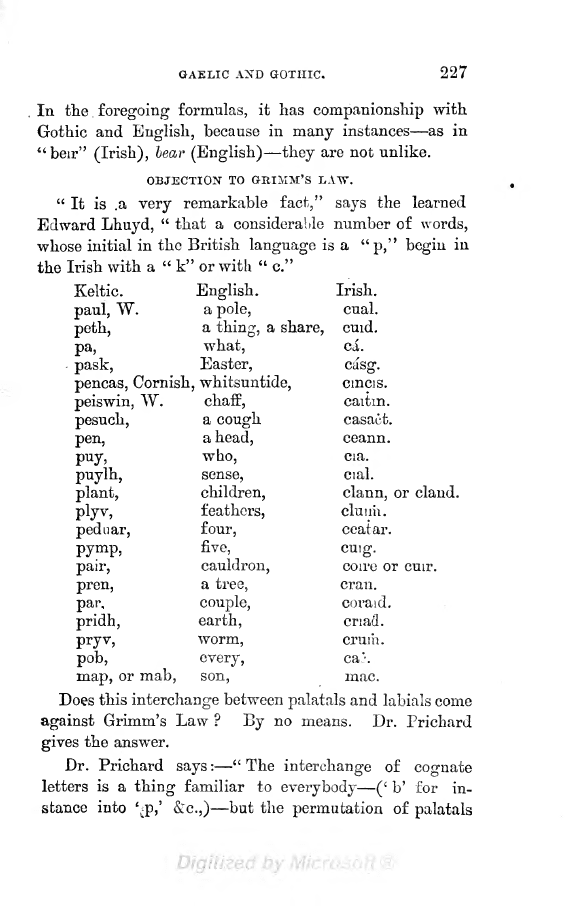
GAELIC
AND
GOTHIC.
227
In the
.
foregoing
formulas,
it has
companionship
with
Gothic
and
English,
because
in
many
instances as
in
"
beir"
(Irish),
bear
(English)
they
are not unlike.
OBJECTION
TO
GRIMM'S
LAV.
"
It
is
.a
very
remarkable
fact,"
says
the learned
Edward
Lhuyd,
"
that
a
considerable
number
of
words,
whose
initial
in
the
British
language
is
a
"p," begin
in
the
Irish
with
a
"
k" or
with
"
c."
Irish.
cual.
cuid.
ca.
casg.
cincis.
caitin.
casact.
ceann.
cia.
cial.
clann,
or
eland.
cluiih.
ceatar.
cuig.
co
ire or
cuir.
cran.
coraid.
criad.
cruih.
ca'-.
mac.
Does
this
interchange
between
palatals
and
labials
come
against
Grimm's Law ?
By
no
means.
Dr.
Prichard
gives
the answer.
Dr.
Prichard
says
:
"
The
interchange
of
cognate
letters
is a
thing
familiar to
everybody
('
b' for
in-
stance
into
*JD,'
&c.,)
but the
permutation
of
palatals
Keltic.
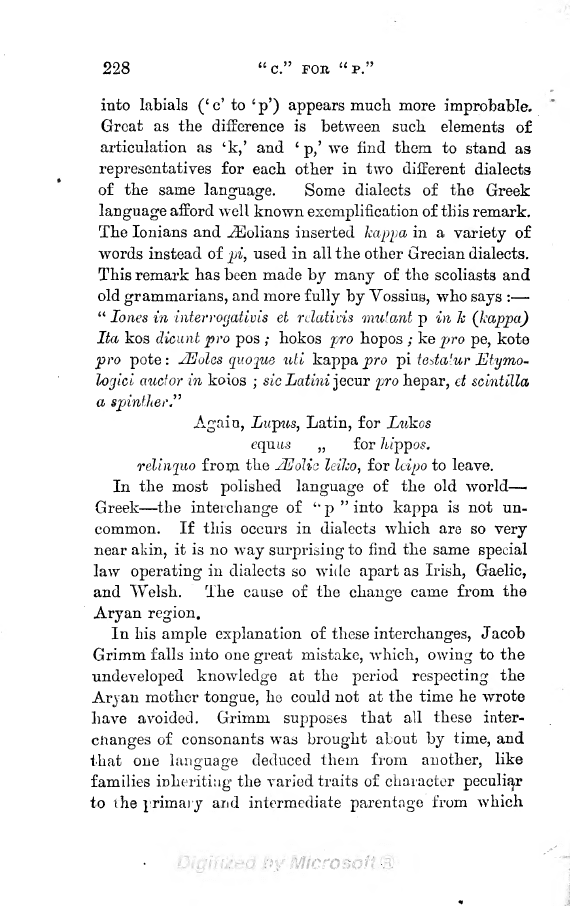
228
"c." FOR
"P."
into labials
('c'
to
'p')
appears
much
more
improbable.
Great
as the
difference
is
between
such
elements of
articulation as
'k,'
and
'
p/
we find them
to
stand as
representatives
for
each other
in two
different
dialects
of
the
same
language.
Some
dialects of the
Greek
language
afford well
known
exemplification
of
this
remark.
The lonians
and
.^Eolians
inserted
kappa
in a
variety
of
words
instead
of
pi,
used
in all the
other Grecian
dialects.
This
remark has been made
by
many
of the
scoliasts and
old
grammarians,
and more
fully
by
Yossius,
who
says
:
"
Tones
in
interrogativis
et
relativis
muiant
p
in Jc
Qcappa)
Ita
kos dicunt
pro pos
;
hokos
pro
hopos
;
ke
pro pe,
kote
pro
pote
:
^Eoles
quogue
uti
kappa pro pi
iedalur
Etymo-
logici
auctor
in
koios
;
sic Latini
jecur
pro
hepar,
et
scintilla
a
spinther"
Again,
Lupus,
Latin,
for
Lu~kos
equus
for
hippos.
relinguo
from
the
JEolic
leiko,
for
leipo
to
leave.
In
the
most
polished
language
of the old
world
Greek
the
interchange
of
"
p
"
into
kappa
is not un-
common.
If
this occurs
in
dialects which are
so
very
near
akin,
it
is
no
way surprising
to find
the same
special
law
operating
in dialects
so
wide
apart
as
Irish,
Gaelic,
and
Welsh.
The
cause
of the
change
came from
the
Aryan region.
In his
ample explanation
of
these
interchanges,
Jacob
Grimm
falls into one
great
mistake, which,
owing
to the
undeveloped
knowledge
at the
period respecting
the
Aryan
mother
tongue,
he could
not
at the time he wrote
have avoided.
Grimm,
supposes
that all
these
inter-
changes
of consonants
was
brought
about
by
time,
and
that
one
language
deduced
them from
another,
like
families
inheriting
the
varied
traits of character
peculiar
to the
primary
arid
intermediate
parentage
from
which
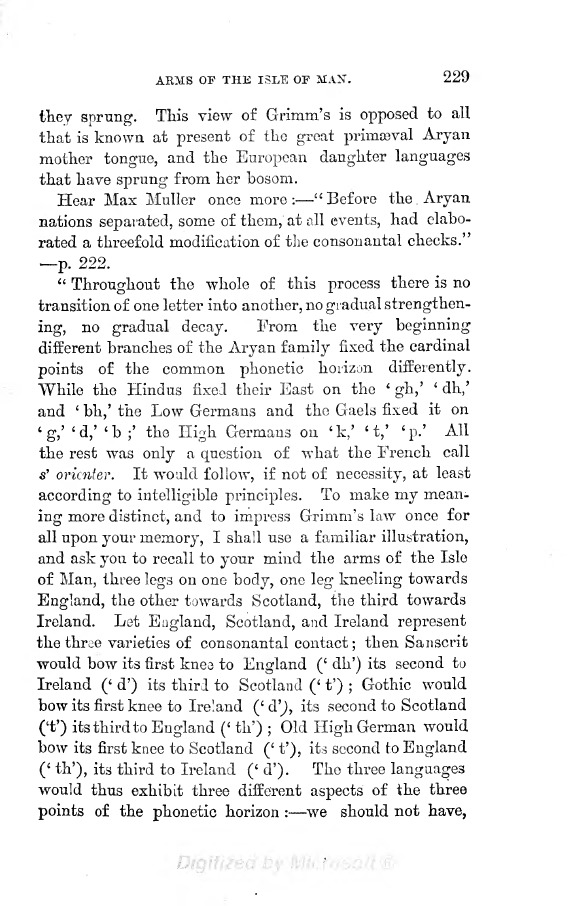
ARMS
OF
THE
ISLE
OF
MAN.
229
they
sprung.
This
view
of
Grimm's
is
opposed
to all
that is known
at
present
of
the
great
primeval
Aryan
mother
tongue,
and the
European daughter
languages
that
have
sprung
from
her
bosom.
Hear
Max
Muller once
more:
"Before
the.
Aryan
nations
separated,
some
of
them,
at all
events,
had
elabo-
rated
a threefold
modification
of
the consonantal
checks."
p.
222.
"
Throughout
the
whole
of
this
process
there
is
no
transition
of one letter into
another,
no
gradual
strengthen-
ing,
no
gradual
decay.
From
the
very
beginning
different branches
of
the
Aryan
family
fixed
the cardinal
points
of
the
common
phonetic
horizon
differently.
While
the Hindus fixed
their
East
on
the
'
gh,'
'
dh,'
and
'
bh,'
the Low
Germans
and
the Gaels
fixed
it on
<g,'
<d,"b
;'
the
High
Germans
on
<k,'
t,'
'p.'
All
the rest was
only
a
question
of what
the French
call
s' oricnter. It would
follow,
if
not of
necessity,
at least
according
to
intelligible
principles.
To
make
my
mean-
ing
more
distinct,
and to
impress
Grimm's
law
once
for
all
upon
your
memory,
I shall use
a familiar
illustration,
and
ask
you
to
recall to
your
mind
the arms
of
the Isle
of
Man,
three
legs
on
one
body,
one
leg
kneeling
towards
England,
the other
towards
Scotland,
the
third
towards
Ireland.
Let
England,
Scotland,
and
Ireland
represent
the three
varieties of
consonantal
contact;
then
Sanscrit
would bow
its
first
knee to
England
(' dh')
its second
to
Ireland
('
d')
its
third
to
Scotland
('
t')
;
Gothic
would
bow its first
knee to
Ireland
('
d'J,
its second
to Scotland
('t')
its
third
to
England
('
th')
;
Old
High
German
would
bow
its first
knee to
Scotland
('
t'),
its
second
to
England
('
th'),
its
third
to Ireland
(' d').
The three
languages
would
thus
exhibit three different
aspects
of
the
three
points
of the
phonetic
horizon
:
we
should
not
have,
